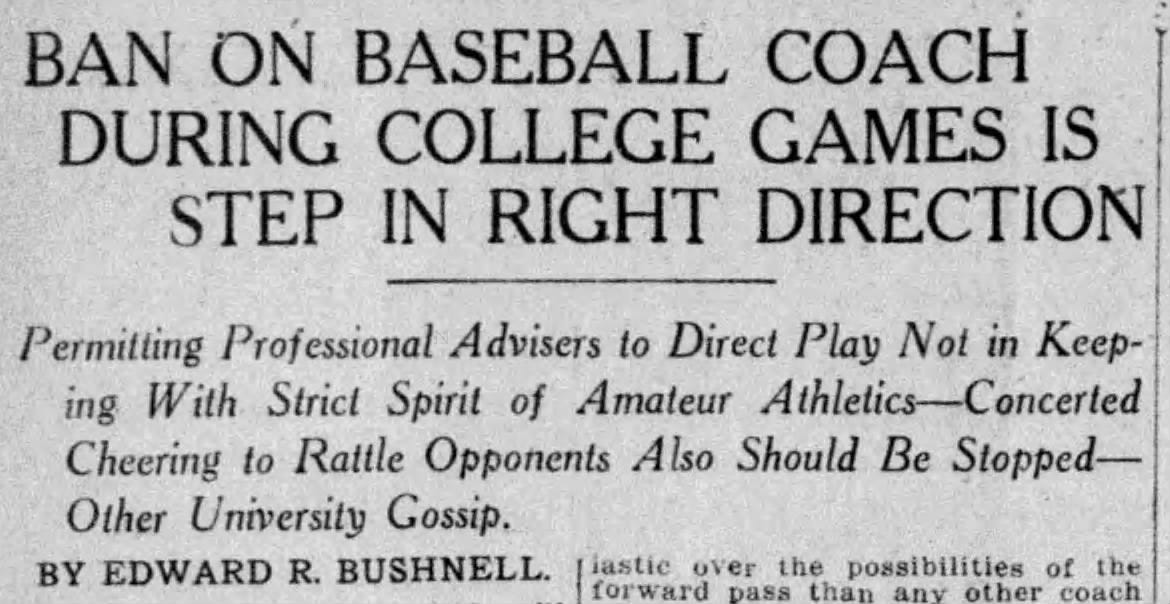Factoid Feast XIV
As discussed in Factoid Feasts I, II, III, IV, V, VI, VII, VIII, IX, X, XI, XII, and XIII my searches through football history sometimes lead to topics too important to ignore but too minor to Tidbit. Such nuggets are factoids, three of which are shared today.
The latest version of Factoid Feast celebrates the role of coaches and coaching in football, even baseball.
Taken For A Ride
We begin in Liberty, Missouri, in 1912, then as now the home of William Jewell College. William Jewell was scheduled to play Westminster College a few weeks later, leading Westminster's athletic director to travel to Liberty to scout a William Jewell game.

A William Jewell supporter recognized the athletic director and offered to drive him around to see the sights before the game. It is unclear how far out of town the driver got before the AD got suspicious; he did not get back into town until the game was over, so his scouting report held little value.
Banning Coaches
Coaching from the sideline was long prohibited in football. There were sometimes suggestions to remove coaches from the playing field to ensure they could not offer input to players, and, it turns out, football was not alone in that line of thinking.
Harvard, Yale, and Princeton agreed in 1914 to remove their coaches from the dugouts in games against one another. At the time, college baseball coaches were not allowed to stand along the sidelines during games, so the impact of coached being banished from the dugout was more symbolic than meaningful. Still, it helped the argument of those who wanted coaches off the football field sidelines.
Shaking Off The Coach
College football allowed limited substitution in 1957, so a player removed from the game could not reenter until the start of the next quarter. The substitution rule affected kicking duties since coaches were reluctant to insert a specialist kicker into games until the last minute or two of a quarter. One of the eleven position players handled the kicking duties otherwise.
That was the case with Washington State in 1957 when Bobby Newman was the Cougars' 2nd-team All-American quarterback and sometimes kicker. Bunny Aldrich was a backup quarterback and primary kicker, so Coach Jim Sutherland substituted Aldrich for another back game early in the fourth quarter to attempt an extra point. Making the kick would put the Cougars within 7 points of Oregon and, sure enough, Aldrich made the kick and left the game.
Then, with just over one minute left, Washington State scored again, leaving the game at 14-13, with an opportunity for the extra point. Coach Sutherland sent in fullback and backup kicker Eddie Stevens to attempt the kick. However, since Stevens had not kicked in several games and Newman, the quarterback, had, Newman overruled the coach and attempted the extra point himself. Newman missed the kick, and Washington State lost to Oregon by one point.
Afterwards, Sutherland commented on his quarterback's decision, saying:
This is what makes football a fine game for young men. Here was a boy with courage of conviction who made a decision to take great responsibility on his own shoulders before thousands of people.
He's our quarterback and he must make decisions. Who can say what might have been? It's over and we're going to forget it.
'Back Shook Off Coach, Missed Game-Tying Kick,' Kansas City Times, October 21, 1957.
While our liberal substitution rules no longer put quarterbacks in the same position as Newman, it is hard to imagine a quarterback shaking off the head coach's decision on a comparable call today.
Click here for options on how to support this site beyond a free subscription.





If a quarterback did shake off a coach's call in modern times, I am sure the coach's post-game rhetoric may be a bit harsher than this one.